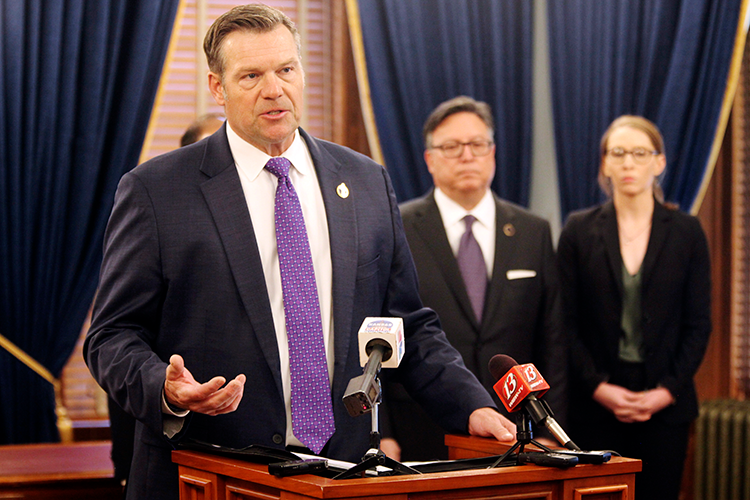11 states sue to stop Biden's student loan repayment plan

Kansas Attorney General Kris Kobach announced a lawsuit on Thursday to block a new student loan repayment plan that provides a faster path to cancellation and lower monthly payments for millions of borrowers. (AP Photo/John Hanna)
Eleven Republican-led states sued on Thursday to overturn President Joseph R. Biden’s new student loan repayment plan, arguing the program is a scheme to provide widespread debt relief that the Supreme Court struck down last year.
The federal lawsuit, led by Kansas Attorney General Kris Kobach, largely mirrors the claims in the case that brought down Biden’s plan to forgive up to $20,000 in federal student loans last year. The states allege the president has again overstepped his authority in creating the Saving on a Valuable Education program, commonly known as Save.
The plan, launched in October, provides lower monthly payments for millions of borrowers and a faster path to cancellation. It has already erased the balances of more than 150,000 enrollees, who originally borrowed less than $12,000 and have been paying for 10 years. The Biden administration has estimated the Save plan will cost $156 billion over the next decade, but the Congressional Budget Office says the figure is closer to $230 billion. The level of forgiveness has caught the ire of conservatives.
“In completely brazen fashion the president pressed ahead and implemented another version of the student loan forgiveness program,” Kobach told reporters at a news conference Thursday.
The Education Department declined to comment on the lawsuit. But in a statement Thursday, it said the administration “has been fighting to fix a broken student loan system, and part of that is creating the most affordable student loan repayment plan ever. The Biden-Harris Administration won’t stop fighting to provide support and relief to borrowers across the country—no matter how many times Republican elected officials try to stop us.”
Joining the suit filed by Kobach were attorneys general from Nebraska, Iowa, Texas, Alabama, Alaska, Idaho, Louisiana, Montana, South Carolina and Utah. They intend to seek a temporary injunction to block the Save program.
Still, while the new lawsuit from the states revives arguments used in previous fights against debt relief, the Save plan is underpinned by a different authority than the forgiveness plan rejected by the high court. Whereas the Biden administration’s failed plan used a 9/11-era law to justify providing $430 billion in debt relief during the pandemic, the new Save plan was created using authority from the Higher Education Act that spawned income-driven repayment plans in 1993.
Kobach argues the Higher Education Act does not permit debt relief for anyone other than people who are permanently disabled, defrauded by their college, working in public service or bankrupt. But in its statement, the Education Department pointed out that Save represents the fourth time the federal agency has used the 1993 authority to expand income-driven options.
Save, which ties monthly payments to earnings and family size, is an amended version of an existing repayment plan known as Revised Pay as You Earn, or Repaye. All four income-driven plans promise to forgive a borrower’s balance after 20 or 25 years of payments.
Kobach, like many conservatives, argues broad debt relief is patently unfair to American taxpayers who did not go to college or saved to pay for school because it “forces them to pay for the student loans for those who ran up exorbitant student debt.”
Kansas was one of six states, including Missouri and Nebraska, that sued the Biden administration in 2022 to block broad base debt cancellation. In a 6-3 decision, the Supreme Court struck down that program last year saying the president didn’t have the authority to enact sweeping policy without congressional input.
Missouri Attorney General Andrew Bailey praised Kobach’s new lawsuit Thursday and said he will be filing a related lawsuit.
Thursday’s lawsuit arrives the same week the White House hosted a day of action to promote the Save plan, which has enrolled more than 7.7 million borrowers to date. The administration estimates the plan could save the typical borrower $1,000 a year on payments because it reduces the amount of income used to calculate monthly bills.
See also:
“Biden administration releases proposed guidelines for student loan hardship”
“These Public Service Loan Forgiveness applicants have seen their student debt erased”
“How can you qualify for PSLF?”



